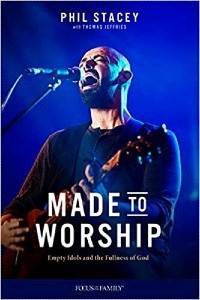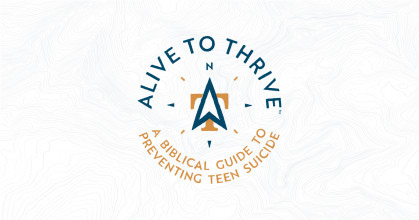Phil Stacey: What God is doing through your life is bigger than you will see here, but this life is just a moment. And one day, we’ll open our eyes in eternity, and forever feel the fullness of joy, forever feel the fullness of peace, and our faith and our hope is that God is orchestrating our lives. The best part of heaven is with us today. It’s God’s presence.
John Fuller: Phil Stacey is with us today on Focus on the Family, and we thank you for joining. Your host is Focus president and author Jim Daly, and I’m John Fuller.
Jim Daly: John, I think we all have dreams of some sort. I remember in high school thinking, “Oh, I’d love to play pro football,” and, uh, I think it’s two percent of college athletes make it to the pros-
John: Wow.
Jim: … so I didn’t realize that.
John: Yeah.
Jim: A small dream, but, uh, the point is, we get caught up in what we think the world has to offer. We forget to trust God and seek His will. I mean, Proverbs three, versus five through six have been kind of a live verse for me.
John: Mm-hmm.
Jim: You know, don’t lean on your own understanding, but in all your ways acknowledge Him, and He will set your path straight. That’s been an awesome verse for me, and, uh, sometimes, though, it feels like I’m not working in concert with the Lord, and that’s Romans 8:28, you know, where the Lord tells us He knows that all things work for our good to those who love the Lord and are called by His name. So that’s hard to s- to understand, as well, sometimes that all things… Really Lord? All things-
John: Hm. Yeah.
Jim: … work for our good? Really? ‘Cause it doesn’t feel like that. Our guest today has seen that promise in his life, and I’m excited to share his story with you today. You’ll be encouraged to look beyond the things of this world to love fully as he talks about in his great book, and to find true freedom in Christ.
John: Mm-hmm. Yeah, I’ll agree with that, Jim. Uh, Phil Stacey is the creative arts pastor at City Center Church in the Kansas City area. And he and his wife, Kendra, have two girls, Chloe and McKayla. Uh, you probably know him from season six of the hit, uh, Fox television show, American Idol. And, uh, in addition to his musical, uh, credits, uh, he’s an author and he’s really captured his life story in a wonderful book called Made to Worship: Empty Idols and the Fullness of God.
Jim: Uh, Phil, welcome to Focus.
Phil: Thank you. I’m excited to be here. What an honor.
Jim: Made to worship, you know, you would not want to sing next to me.
Phil: (laughs)
Jim: (laughs) I just… So I’m gonna challenge that right from the beginning.
John: Are all of us made to worship?
Phil: I actually tell people, I tell people at my church, “If you’re a bad singer, then make sure you’re singing out really loud, because if nothing else, it’ll force the people around you to participate-
Jim: Oh, my. Yeah.
Phil: … just to drown out the sound of your voice.” So.
Jim: There you go. I’m thinking in the car, maybe. Anywhere by myself-
Phil: Right (laughs).
Jim: ,,, is safe, but I kinda lip sync (laughs) when I’m at church.
Phil: It’s funny. I, I, I think, you know, the Bible, one of the most requested gifts from God is our song. Course, music is just a small aspect of what worship is, but, uh, but I love it, because it puts us all in unity. You know, I was in the military. I remember doing these marches, and we marched to cadences. And we were just all in step. And, you know, Christ’s one prayer for the people who would believe because of the testimony of the disciples was that we’d be one. So I just think it’s just a beautiful opportunity-
Jim: That’s a great way to look at it.
Phil: … for the church to be one, you know?
Jim: And maybe we can all be in our own bad singing group together.
Phil: That’s it. Do you sing well, John?
John: (laughs)
Jim: Maybe that’s gonna be happening.
John: Uh, well, I mean – [crosstalk].
Jim: [crosstalk] company B. So let’s go to American Idol. That had to be such an amazing experience.
Phil: Oh, for sure.
Jim: And, you know, I don’t watch it often, but Simon, is it Simon-
Phil: Cowell.
Jim: Cowell.
Phil: Yeah.
Jim: Is that guy as mean as he seems?
Phil: 100 percent. Oh.
Jim: (laughs)
Phil: But, you know, uh, you know, I, I feel like he’s a better comedian than he is a critic. Like, I just loved watching Simon before I was on the show. The benefit is, by the time I was on, I was on in 2007, so that was, you know, six, seven years into the show, and, uh, I think you know what you’re getting yourself into. You know what I mean? Like, by the time you make it to the show, you know you’re putting yourself in a position where the man is gonna say something to you at some point. He can criticize everybody, so he’s gonna criticize you. But I thought it was fun.
Jim: Hey, uh, let’s start from the beginning. You grew up in, what you call, a musical, uh, ministry family.
Phil: Mm-hmm.
Jim: Describe that for us. What was that like?
Phil: Well, my dad was actually a professional musician before he came to the Lord. Uh, so he got saved in the early ’70s, uh, became a pastor. And, uh, basically took all those musical skills into his ministry. So pretty much everywhere we went, he was sitting on the piano or, or participating in some capacity.
Jim: Hm.
Phil: But, uh, I have a brother and a sister. Uh, my mom was a great singer, so she kinda grouped us together.
Jim: Wow.
Phil: We had, like, the family trio, and, um, I don’t know. It was basically learning to communicate through song. I mean, it was pretty much what we did.
Jim: And in that context, how much pressure did you feel, or did you feel pressure at all? Was it just part of the normal thing?
Phil: There were times (laughs). There were times. It wasn’t just my family, my extended family. My, my, my, my mom has, you know, eight brothers and sisters, and, and they all have multiple children, as well. So you get the family together at these reunions, and, and everybody sang.
Jim: You talk in the book about school and some of the difficulties you had in school.
Phil: Mm-hmm.
Jim: Describe those.
Phil: Well, I just, I was just a little bit of an awkward kid, so, uh, you know, I didn’t-
Jim: How?
Phil: I didn’t have… I wasn’t great at communicating outside of music. So really, I, I had a little bit of a lonely childhood. I guess there’s people out there that’d be like, “Well, you had friends.” And, and I did, but it was really music that, that invited people to me. Uh, it wasn’t me going out and being like, “Hi, my name is Phil,” anything like that. Um, so because of what a, an important aspect music was, there’s just something special about seeing a fourth grader get up and sing at the school talent thing, and, and he can actually hold a tune or something. So everybody would come up to me afterwards, “Oh, my goodness. Here’s my name.” You know?
Jim: So you had a lot of identity in, in, in doing this, so.
Phil: For sure, oh yeah.
Jim: At the same time, I mean, you weren’t doing well. I think you had to repeat eighth grade, right?
Phil: Well, I didn’t know we were gonna talk about that. (laughs)
Jim: Yeah, it’s in your blood.
Phil: Thanks for bringing that up, sir. (laughs)
John: You wrote about it. It’s fair game.
Phil: That’s true. You’re right. Yeah, I, I did. I had to repeat the eighth grade, and…
Jim: Um, at one point, you chose art over music. So obviously, you’re not into math and science. (laughs)
John: (laughs)
Phil: I certainly wasn’t then.
Jim: Art and music at that time-
Phil: For sure.
Jim: … were really the two tugs in your heart.
Phil: Mm-hmm.
Jim: Um, what brought you back to, to music after you kinda spent some time in school doing the arts?
Phil: Yeah, I… Well, you know, you, you get older, and my whole childhood was singing. And everywhere you went… Again, you see kids that can sing, and everybody goes nuts over them. Uh, but then all of a sudden, I’m 14, 13, 14 years old, my voice is changing-
Jim: Oh.
Phil: … and I couldn’t sing anymore. So when I went into high school, I had to choose. They had all the arts classes together. Band, choir, art, all that stuff, and ultimately decided, “You know what? My music days are behind me. I’m gonna pursue this art thing,” and, and I loved it, but then my, my sister encouraged me to do a talent competition, or not a talent competition, but basically a variety show with her. And all of a sudden, again, it kind of opened the door to a lot of friendships.
Jim: Hm.
Phil: So now I have a ton of people saying, “Hey, you should come join choir with us, and, and you should come be in shows with us.” And so it kind of opened up the door to a social life if that makes sense.
Jim: Right. So music, once again, became kind of the core of your identity in some ways.
Phil: Pretty much.
Jim: Yeah.
Phil: It’s been a common theme. I have one hammer in my tool shed, and it’s-
Jim: Uh, no, no.
Phil: (laughs) It’s music. Yeah.
John: He knows it well.
Jim: Hey, you know what? At least you have a hammer. Some of us don’t have a tool (laughs)-
Phil: That’s right. Hey, I’ll take it.
Jim: But let me, let me ask you about your dad. I thought this was a really interesting story in the book about, um, you got a job. You’re waitering. I think it’s in high school, right?
Phil: That’s right, yeah.
Jim: And, uh, lot of people left early. I can remember working at a fast-food place. I think I recall a scene somewhat like this where it was a light evening. Everybody left, and there’s two of us remaining.
Phil: Right.
Jim: That’s kind of your story.
Phil: This was… Yeah. It was, it was a monumental moment. So the story begins. I’m 16 years old. I get a job working as a server for Village Inn. So a lot of people going to Village Inn’s Pancake House. It’s a pretty good-sized restaurant, but I was an awful server. And to this point, again, like I just now said, I, I’ve got one hammer. I just felt like a failure at everything. I wasn’t doing well in school.
Jim: What would make you a bad server?
Phil: I don’t know. I just couldn’t do it.
Jim: You couldn’t the orders, right?
Phil: I would drop trays, and I would just… Like, my manager would not give me a section of more than one table.
Jim: (laughs)
Phil: It was bad.
Jim: That was a clue.
Phil: And he would only, he would only book me to serve tables on, like, Mondays and Tuesdays when nobody ever goes out. So he’s like, “We’ll teach you eventually.” But I just felt like I just couldn’t get it. Um, and so finally, one, one of these Monday nights, he ends up, uh, scheduling me as a server, but there’s not really anybody in the restaurant. I’m sitting around… And, and I started working at this restaurant ’cause most of my friends worked there. Uh-
Jim: How it normally happens.
Phil: Right, exactly. So we’re sitting there and we, none of us are really making a whole lot of money at this point. And we, we thought it’d be funny, let’s all just quit, uh, tonight. The manager literally left early, so he just tosses us the keys. He’s like, “Turn the lights off. Uh, lock the doors when you leave.” I mean, I knew it was the wrong thing to do, but I watched as, one by one, all these people left. Uh, and suddenly, there’s only three people left. There’s a host, there’s a cook, and there’s only one server.
John: (laughs) And it’s you.
Phil: And it’s me.
Jim: And there’s more than one table there. It’s busy.
Phil: Oh, there’s a lot more, yeah. And, and it was fine, because really, there wasn’t anybody coming in until, like, 9:00 at night. All of a sudden, you could see all these cars turning into the parking lot. I’m like-
Jim: Uh-oh.
Phil: … “What’s happening right now?” I got… I just froze, and all of a sudden, these people just start flooding into the doors. And, uh, and I realized instantly that I was gonna have to serve all these people. And, uh, and I’ve never served a table, or more than one table at a time.
Jim: (laughs)
Phil: Uh, so my first instinct if you’ve ever been in a situation where you feel just completely overwhelmed, maybe you’ve asked God to get you out of that situation. I called my father and asked him to get me out of that situation. I was like, “Dad, you got to let me quit. (laughs) I cannot do this.” Uh, and there’s a pause. He says, “Well, son. Do you want to be a boy, or do you want to be a man?”
Jim: This is the moment.
Phil: That’s right. And so I’m like, w- you know, I’d had no interest in being a man in that moment. I wanted to come home, but I was like, “Well, you know, what do you want me to do?” Uh, and he said, “Well, I want you to do what you committed yourself to do.” And the pivotal moment here is that you surrender your will to your father’s. Even at 16, I knew that there’s nobody in the world rooting for me like my father is, and so I’m trusting him. And so I’m like, “You know what? I’m gonna do this. All right, dad. I’ll do it.” By the time I get off the phone, the entire restaurant is set. Restaurant lingo for there’s a person in every single seat in the restaurant, and there’s a wait up front. Um, so I jump up on the host station, and I’m like, you know, it was an Amway convention was in town.
Jim: Oh, boy.
Phil: So th- all these folks came in from this Amway convention.
Jim: (laughs)
Phil: You know, there’s gonna want coffee and pie, and all this stuff. And, uh, I jump up on this host station. I’m like, “Can I get everybody’s attention? Welcome to Village Inn. The bad news is I’m your only server, and I’m not very good. But if you’ll be patient with me, I’ll take care of you to the best of my ability.” And they’re all like, “Woo, Amway.”
Jim: (laughs)
Phil: At least it was a motivating crowd.
Jim: Well, at least they were happy.
Phil: Right. But immediately, you’re kind of sensing, you know, this moment of, like, trusting in my father instantly dissipated because I didn’t know what to do first. And once I did go to the first table, what do I do next? Do I go get their drinks and come… Uh, just the order of operations, I didn’t know them.
Jim: (laughs)
Phil: My boss isn’t there, and for some reason, we didn’t call him. Um, and I’m just standing there just feeling so, like, abandoned and alone and, like, I’m in over my head. I can’t do this when all of a sudden, the front door opens up, and in walks my father. And he says, “How can I help you?” And it was just kind of pivotal, because he was the personification of my Heavenly Father, even through the night. I mean, he ended up staying ’til, like, 3:00 in the morning. He served drinks for me. He made salads he had absolutely no idea how to make. Um, and, uh, but he… The point is, he was there. And, uh, through this whole night, I’m thinking of these Bible verses are just kind of going through my head, and it was like God was using that. My dad was a preacher. This was the best sermon he ever preached to me was just his presence.
Jim: Hm.
Phil: And the fact that he was cheering for me, it was like the whole load was taken off of me. And because I obeyed my father, because I submitted my will to my father, that night changed me. First of all, uh, I went from a guy who couldn’t do this, felt like a failure to, like, a grandmaster ninja warrior of serving tables, ’cause I had to serve a whole restaurant, you know? Uh, and I went from feeling like I couldn’t do something to feeling like, you know what, there’s nothing that’s impossible-
Jim: Yeah, that is awesome.
Phil: … if, if I’m working at it. And of course, I prospered that night because I listened to my dad. I ended up making a killing in tips, and-
Jim: (laughs)
Phil: … and then just a couple of mo- a couple of weeks later actually, they ended up making me an assistant manager.
Jim: (laughs)
Phil: And, uh, I mean, it was, it was a really cool deal. So it-
Jim: Wow. You went from the gutter to the penthouse.
Phil: 100 percent. Just transformational.
John: Oh, my.
Phil: I’m, like, a high school kid with a salary position.
John: I love it. That is a great story. And we’re talking today on Focus on the Family with Phil Stacey. And, uh, this story and others are captured in his book Made to Worship. And we’ll encourage you to stop by focusonthefamily.com/broadcast or call 1-800, the letter A, and the word FAMILY.
Jim: Phil, you went to Lee University. I think you became a, uh, Lee Singer, as it’s known. That included making a trip to China. What happened and what did you learn through that experience?
Phil: Yeah. I went to China after my freshman year in college, and the Lee Singers is just a singing group. They have several ensembles at Lee. It’s a very musical school. I mean, we have… Uh, if you watch any musical reality show, you’ve seen a ton of Lee students come through. And if you’ve listened to country music or Christian music, you’ve listen to the work of a lot of Lee students. Um, and I went and, uh, and I auditioned. Got into this group. Every summer, we took a, a mission’s trip. The very first one, of course, was China. And we’re there to do missions work and to sing, uh, gospel music and, uh, uh, but it was polarizing to me to see how devoted so many of the religious followers of Buddhism were to their faith. So I would go into these temples or pagodas, you’d see people with their face down on the ground or or weeping as they burned incense or something. And I just got a, a sense of jealousy for, for God on behalf of how un-dedicated to worship I had been. You know, like, I would sing or whatever, but I just, I had never been in that poster of humility-
Jim: Hm.
Phil: .., before God. I think I, to that point, I had thought of God as almost like a buddy or a partner, maybe a guide. And, and my family, we, we read the Bible together every day. I was in a church. I was super involved in, in all that stuff, but I think it was just this revelation of who God is. Like, He’s God. And that’s where I want to be. It’s not… I don’t want to be on equal footing with Him. I want to be, I want to be His child, you know. So it just changed the way that I worship Him, and, uh, and, and my personal dedication to Him.
Jim: Um, let’s move to you meeting Kendra. You get back from China-
Phil: Mm-hmm.
Jim: … and you meet your wife.
Phil: Right.
Jim: Uh, it sounded like it was pretty fast, uh, in terms of-
Phil: Oh, yeah.
Jim: … “Hi, my name’s Phil. Will you marry me?” (laughs)
Phil: (laughs) Kind of, yeah. I mean, by then… Okay. So through my life, you know, I, I was a follower of Christ. I think I went to the altar when I was seven years old. I had some, you know, some confusion around my faith when I was in high school, but I w- I, something over the course of my freshman year in college just really drew me in. I think I was truly born again in that timeframe. And of course, like, uh, going to China and, and learning and developing a new level of, of worship and devotion to Christ, I think I was prepared. And, uh, and I thought actually… A couple of my friends on the China trip, we made jokes. It was a guy and a girl, and we made jo- not really jokes, we were like, “We’re gonna, we’re gonna just devote our life to missions, and we’re never gonna get married. You know, we’re gonna be like Apostle Paul,” and, and, uh, those two ended up marrying each other. But (laughs)-
Jim: (laughs)
John: (laughs)
Phil: But the day I got home, one of my friends from high school introduced me to his girlfriend, and his girlfriend’s best friend was Kendra. And, uh, instantly thought, you know, sh- this is a beautiful girl. And she was funny, hung out with her. But that night, I did go home and tell my dad I fo- I met the girl I was gonna marry. It was her devotion to Christ, really, I mean, just set her apart. And, uh, knew I’d found a partner.
John: Hm.
Jim: All right. Let’s ge- get into a bit of the, uh, the Idol chatter, I guess you’d call it. I don’t know. I do-… You know, I’ve watched a bit of that. I watched The Voice.
Phil: Nice.
Jim: Uh, you know, I’ve seen a few of those shows, uh, but to your story, a friend convinced you to audition, and you made it through the, the celebrity judges. Uh, uh, you can talk about the process. But something was happening at home. Uh, describe that whole adventure.
Phil: Yeah. (laughs) Yeah, I, um, let’s see. By this point, it was 2006. My wife and I had a two-year-old daughter, and, um, uh, she was pregnant with our second daughter. Like you said, I missed a buddy’s wedding. When you’re in the military, you miss other people’s events. It’s just what you do. And he told me the only way he’d forgive me is if I audition for American Idol.
Jim: (laughs) It’s an interesting forgiveness trail.
Phil: Yeah. I know. It w- I mean, It was kind of a funny thing. He wasn’t really mad at me, but he just wanted to see me do it. And it was my last year I was even eligible, ’cause I was 28 years old. But so I went to my commanding officer, and I asked him for permission. And the first audition was September the 2nd. I didn’t realize that it was, like, cut up into different auditions. So the first day of audition, you’re going into this big arena. It’s full of people. I think in Memphis, we had 16,000 people audition that day. Uh, so obviously Randy, Paula, and Simon are not gonna see all of those people, but they dragged it out. I mean, I didn’t mean Randy, Paula and Simon until October the 5th.
Jim: Hm.
Phil: So that was over a month away. And by the time that came along, baby’s due. I, I, I was not even gonna go, but my wife was like, “You’ve made it through, you know, three levels of auditions. You might actually make it to Hollywood.”
Jim: So that 16,000 got narrowed down to-
Phil: Probably couple of hundred-
Jim: Couple hundred, wow. Okay.
Phil: … at that point for, for the three judges. And sure enough, I, I come to Memphis to do my audition, and my brother and my dad are with me. Uh, and, uh, I get a call at, like, 3:00 in the morning, and it’s my mom who went to go be with my wife just in case. And she’s like, “Do you hear anything?” And sure enough, in the background, there’s a baby crying. And, and I, I had missed the baby’s birth. So I go, and, and, and immediately, I’m like, “I need to get home to be with Kendra.” But I go to the producers, and I’m like, “Hey, guys. I’m sorry. I’m not gonna be able to do the audition. I got to get home.” They’re like, “Well, why?” I said, “My baby was just born,” and, you know, they’re like, looked in the cameras immediately.
Jim: (laughs) Yeah, right.
Phil: They’re like, “Tell us that story,” you know? So they ended up giving me, like, a three-minute segment at the end of that audition episode and let me go and audition first. And then they, they put me through to Hollywood.
John: Hm.
Jim: Boy, that’s great.
Phil: I know. If they didn’t put me through to Hollywood, uh, that would have been terrible.
Jim: (laughs) Yeah, right?
Phil: They’re like, “Well, you missed your baby’s birth, sorry buddy.”
Jim: Yeah, it’s all downhill.
Phil: I know (laughs).
Jim: But, uh, but going through that, then what happened?
Phil: We had a double elimination week. One week, I was the first one that was, that was eliminated. Um, but made it into basically the top five week. And it was crazy experience. You get to meet all these celebrities that, you know, you grew up listening to. We met Diana Ross, met Bon Jovi, Gwen Stefani, and Jennifer Lopez. And they all come out, and they mentor you. And, uh, you get to do a lot of fun stuff. Like, every Sunday, we did these big elaborate commercials for Ford-
Jim: (laughs)
Phil: … which was a blast. You know, you’re going on set, and you’re, they’re getting you dressed up, and then you’re doing all these photo shoots, which I hated, but all the girls just loved, ’cause they, you know, they do all the makeup, and they bring out these wardrobes. Anything you put on your body; you get to take home. So, like, they’re just trying on all these clothes, and it was just a really interesting experience.
Jim: Yeah.
Phil: Hollywood was another different world of experience.
Jim: How did it change you, I mean, you know, from what you were going into that, then coming out?
Phil: Well, there was a couple ways. There was, there was some healthy growth, and there was, there was some unhealthy stuff that happened. So on the, on the healthy side, I think that I stopped really being so consumed with what other people thought of me.
Jim: Hm.
Phil: Uh, which is weird on a show like American Idol, because you’re trying to appease the people back home and all this. I think, you know, my book starts with a, a really wonderful thing that my wife helped me see. You know, I remember every single week, and if you go, the, these videos are out there on the internet, um, and you can see every week how terrified I looked. Like, my eyes are just like, “Uh.”
Jim: (laughs).
Phil: I’m, like, shaking. And then there’s just one week that goes to, like, a completely comfortable level, and the thing that happened between was my wife helping me to realize that I was letting pride into my life. And, you know, I was a devoted follower of Christ at this point. I, I, you know, was a w- was leading worship at a church, and, and all this stuff, and I was just opening the door to some stuff. And, and that did play out. I did open the door to some stuff, specifically on the American Idol tour. But, uh, but in this moment, my wife kind of helped me realize, you know, even this kind of humility, the kind of humility where basically you’re just worried about what everybody else thinks about you is still a form of pride, because God is going to do… When you’re, when you’re following the Lord, the Holy Spirit is gonna empower you to do what He’s called you to do. So if He wants me to, to win, if He wants me to get cut, whatever, I’m submitted to Him as Lord. And whatever happens, He’s sovereign, like you were talking about. All things work together for the good, for those who are in Christ Jesus. So no matter what happens in this experience, I can trust Him, my Father, you know, just like I did my dad at Village Inn. I can trust Him. No matter what happens, He’s going to be with me. He’s going to be there working-
Jim: Yeah.
Phil: … on my behalf. And so I think there was just this thing, and I wish I could impart this to every follower of Christ, to stop worrying so much about how you’re perceived by other people, that there is a real peace and joy in just following the Lord, just living for Him, just surrendering to His purpose and letting it play out, just trusting Him.
Jim: Well, that may be the golden nugget of the whole discussion.
Phil: Yeah.
Jim: I mean, that really is it-
Phil: That’s all.
Jim: … especially in the culture today.
Phil: Yeah.
Jim: And Phil, that person who feels like God has forgotten them… You know, we’ve talked a lot. You’ve had an amazing, you know, journey. The Lord’s brought you through a lot of things, introduced you to your wife rather quickly.
Phil: Yeah (laughs). Right.
Jim: You know, all that stuff that you put into your great book, Made to Worship. Um, but that person that feels forgotten that may be listening right now, you know, they’re stuck in a job they really don’t like-
Phil: Yeah.
Jim: … um, what, what advice do you have for them living out Romans 8:28? How do you stick with it and trust that God does know where you’re at, He does love you, He does care about you? How do you get a different perspective on your life when it doesn’t feel like it’s going the way you felt it would?
Phil: Yeah, I think, I think it comes down to that point of surrendering your will to your father’s and trusting. And I know that that’s not easy for a lot of people. But I would really encourage that person, if you’re listening to the program, to really dig into the scriptures. What you’re gonna find is that out of 66 books, there’s not a single main character from the Bible that I would trade lives with. They had struggles. I mean, we’re talking real struggles, people that lost their entire families, people that were losing their friends, uh, to persecution and martyrdom, looking left and right. I mean, the entire book of Hebrews is written to an audience that is watching their friends die for their faith. God’s sovereignty turns all of these ashes into something beautiful. If you’re in the part of your story that is difficult, if you’re in your part of the Joseph story where you’re imprisoned (laughs) or where you feel imprisoned, or where you feel like you’re the lowest of the servants or whatever, remember that God’s sovereign plan over your life is already spoken. So if you can put your faith in what God has already spoken through His word, uh, through the scriptures and understand that the big mosaic that He’s orchestrating is bigger than any of us could possibly see. Your faithfulness to Christ in the midst of this will be effective for generations to come. I think about how my, my granddad was a pastor, and he just planted little churches. Um, and he felt like he wasn’t educated enough to be a pastor, so once they could afford a real pastor, they would bring somebody in… Uh, but man, I’ve gotten to share the gospel with millions of people now because of the platform of American Idol. I went around and worked with all these missionaries all over the world. It’s in the book. Uh, just really cool opportunities, but everything that I do including this broadcast, that’s an extension of that man’s ministry.
John: Hmm.
Jim: Huh.
Phil: You know? It’s, it’s, it’s his faithfulness in the little things. It couldn’t have been easy-
Jim: No.
Phil: … to put up these buildings in Kentucky, you know, you know, almost single-handedly some of them. But look at how that’s… It’s not just me. Like, so many of my cousins are pastors now. So many of the people on that side of the family ha- who have raised their kids, missionaries now. Just incredible. What God is doing through your life is bigger than you will see here, but this life is just a moment. And one day, we’ll open our eyes in eternity and forever feel the fullness of joy, forever feel the fullness of peace and, and our, and our faith and our hope-
Jim: Yes.
Phil: … is that God is orchestrating our lives. The best part of heaven is with us today.
Jim: Mm-hmm.
Phil: It’s God’s presence.
Jim: Yeah, amen.
Phil: And we can take that no matter where we go.
Jim: That is well said, Phil. And it’s been great having you with us. And it’s a wonderful, uh, moment to be able to tell you we have caring Christian counselors. If you’re struggling in that area and you’re not sure that God remembers who you are, I guarantee He does. Um, but call us and let us schedule a time to have one of those caring Christian counselors talk with you. Uh, we have plenty of resources here at Focus to help you, uh, get a different perspective that is, I think, a godly perspective that gives you the peace of mind that the Lord knows you, He loves you, He cares for you, and just be faithful. I think there’s nothing that puts the smile on the Lord’s face like a person’s faithfulness-
John: Yes.
Jim: … especially a person who’s, uh, feel like they’re at the bottom. I think when we can respond to the Lord in that moment, it warms the heart of God that-
John: Yes.
Jim: … His creation loves him-
Phil: That’s good.
Jim: … despite their circumstances. And I count it a privilege as the orphan kid growing up that I could feel God’s presence and love the Lord even though my circumstances were horrible.
Phil: Beautiful.
Jim: Um, and I think it does put a smile on God’s face that we love Him and trust Him, even in those moments.
John: Yeah, and if you’re feeling, uh, a need to talk to somebody, please give us a call. Um, you can also get a copy of Phil’s book, Made to Worship, when you get in touch. Our number is 800, the letter A, and the word FAMILY. 800-232-6459.
Jim: And John, also, uh, you know, we want to get this book into your hands. We say this a lot. If you can help us, be part of the ministry, that’s the Lord’s perspective there, we’re all doing this together. Uh, if you can join our monthly sustainer group, we’ll send you a copy of Phil’s book as our way of saying thank you for being part of the ministry. If that doesn’t fit, um, a one-time gift will do the same for you. We’ll send you a copy of the book, and actually if you can’t afford it, we’re not gonna hold it back, that’s not what we do as Christians. So if you need it, get in touch with us, and we’ll give it to you trusting others will cover the expense of that. And, uh, I just, again, thank you, Phil, for sharing your story with us.
Phil: It’s been an honor. Thank you, guys, for having me.
John: Hm. And once again, donate and get a copy of Phil’s book, Made to Worship, or connect with one of our counselors or find other resources all at our website, focusonthefamily.com/broadcast, or call 800, the letter A, and the word FAMILY. Well, have a great weekend, and join us on Monday, you’ll hear a heartfelt tribute to a godly dad.
Brent Reaves: I totally understood God, because of the man that was my father. He showed who God was every single day. Well not every day, ’cause, you know, he had some imperfections, too. He, he wasn’t Jesus by any means. You hear me? But he tried his best to live according to how the Bible wants us to live.





















